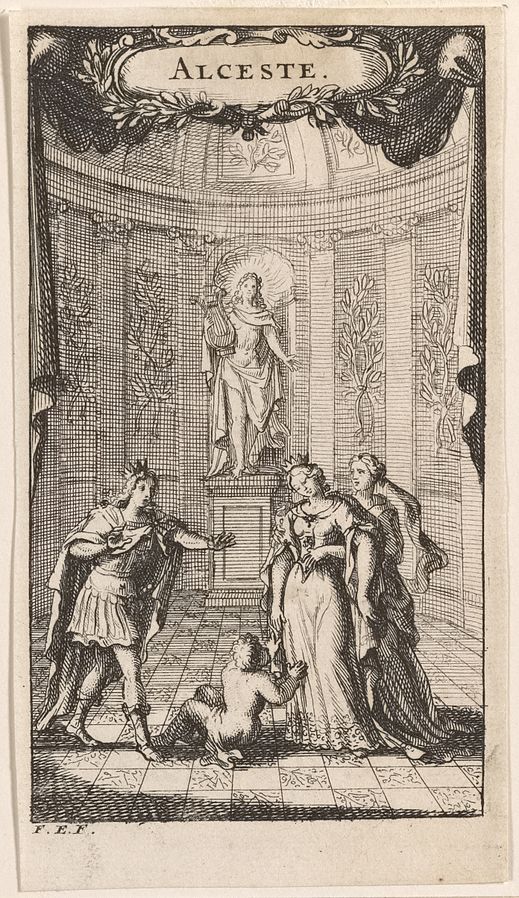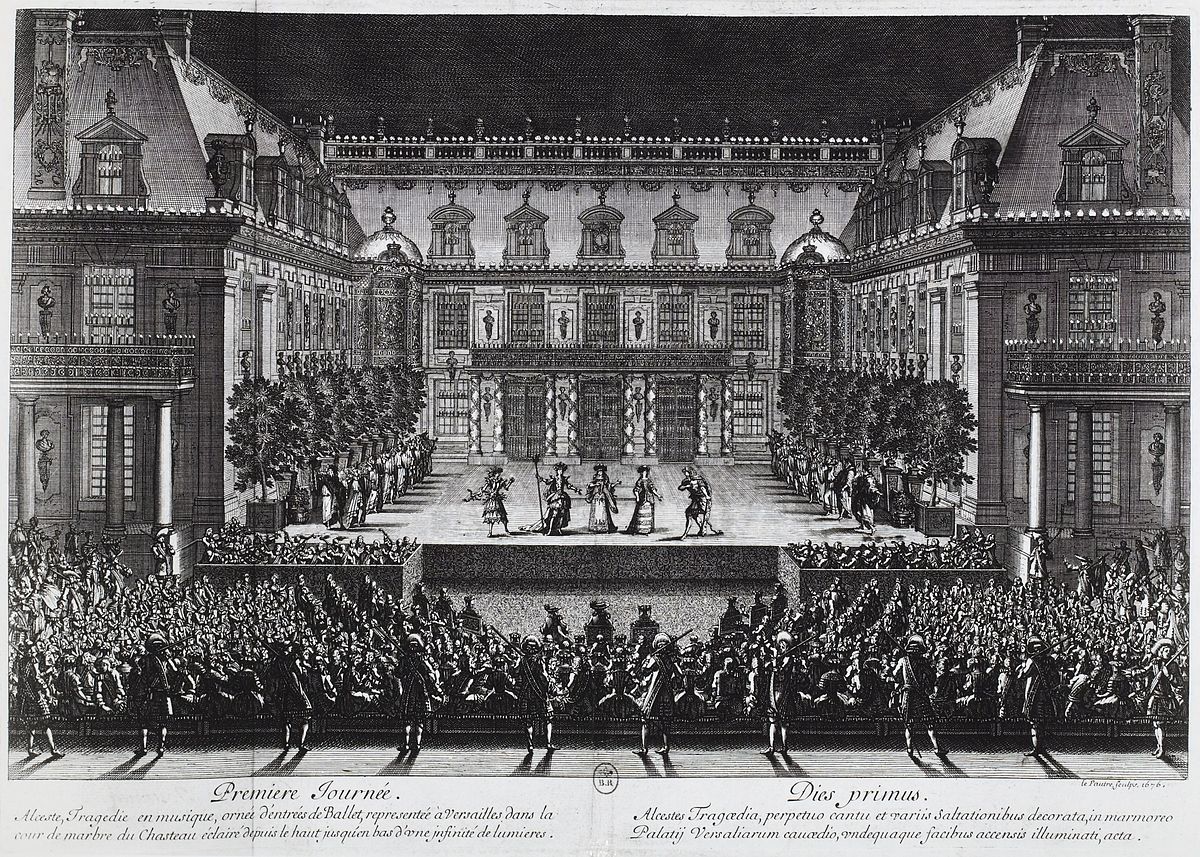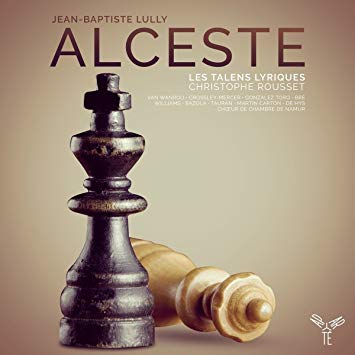- ALCESTE, OU LE TRIOMPHE D’ALCIDE
- Tragédie en musique in a prologue and 5 acts
- Composer : Jean-Baptiste Lully
- Librettist : Philippe Quinault, after Euripides’ Alcestis
- First performed : Théâtre du Palais-Royal, 19 January 1674, then at Saint-Germain, finally in Paris
| NYMPH OF THE SEINE | Soprano | Mlle de Saint-Christophe (or Saint-Christophle) |
| LA GLOIRE | Soprano | Mlle de la Garde |
| NYMPH OF THE TUILERIES | Soprano | Mlle Rebel |
| NYMPH OF THE MARNE | Soprano | Mlle Ferdinand |
| ALCESTE, Princess of Iolcos | Soprano | Mlle de Saint-Christophe |
| ADMÈTE, King of Thessaly | Haute-contre | Bernard Clédière |
| ALCIDE (Hercules), Greek hero | Baritone | Jean Gaye |
| LICOMÈDE, King of Scyros and brother of Thetis | Bass | Jacques Godonesche |
| LYCHAS, confidant of Alcide | Haute-contre | François Langeais |
| STRATON, confidant of Lycomedes | Bass | Antoine Morel |
| CÉPHISE, confidante of Alcestis | Soprano | Mlle Beaucreux |
| CLÉANTE, knight of Admetus | Tenor | Frizon |
| PHERÈS, father of Admetus | Tenor | Gingan |
| CHARON | Baritone | Antoine Morel |
| PLUTON | Bass | Jacques Godonesche |
| THÉTIS, a sea-nymph | Soprano | Mlle des Fronteaux (or Desfronteaux) |
| APOLLON | Haute-contre | Le Roy |
| PROSERPINE | Soprano | Mlle Bony |
| THE GHOST OF ALCESTIS | Silent | |
| ALCETON, a Fury | Haute-contre (en travesti) | Le Roy |
| A REBUFFED GHOST | Soprano | |
| EOLE, King of the Winds | Baritone | Puvigny |
| DIANE | Soprano | Mlle Piesche |
| MERCURE | Silent |
Epiphany: Lully is fun.
His operas are, after all, full of lively, toe-tapping dances; brilliant choruses; and plenty of spectacle (storm-tossed ships; palaces and gods descending in chariots; assaults on walled cities; descents into the Underworld) – served up to Louis XIV and his court. (Hervé Niquet compares French baroque opera to Broadway.)
I watched Cadmus et Hermione and Atys in July – and wasn’t impressed. Atys was a kind of declaimed Racine. It opened with a right royal bootlicking (“un héros dont la brillante gloire les a presque tous effacez) ; the highpoint of the action was the hero lying down for a nap in the middle of the opera; and at the end he turns into a tree.
“Atys was one of Louis XIV’s favourite operas – l’opéra du Roy. If this was what French royalty’s taste was like,” I concluded, “the Revolution might have been a great thing for music…”
I am, of course, an idiot.
Atys was one of the first French Baroque operas resurrected (1987). It’s beautiful in parts (notably the sleep scene and the funeral chorus) – but it’s also sedately soporific; William Christie conducts at a very slow tempo. The spectacle, too, that’s such an important part of the genre is missing. Result: tedium.
I listened to the prologue and first act of the CD to see if it improves on reacquaintance. It doesn’t; it drags. Even Lully enthusiast David LeMarrec calls the recording “très figé, un peu glaçant” (“very frozen, a little chilling”). Certainly it still leaves me cold.
Alceste moves swiftly, in Rousset’s Grammy-nominated 2017 recording, and it’s pure pleasure.
The opera was Lully and librettist Quinault’s second collaboration, after the success of Cadmus. It is loosely based on – “inspired by”, even – Euripides’ tragedy about a devoted wife who dies in her husband’s place. (Gluck’s 1767 opera is much more faithful.) It was a bold decision; tragedy was considered the prerogative of straight theatre, not of opera.

Boileau and Racine (librettist Quinault’s rival) considered it a profanation, with its introduced sub-plots, comedy, and spectacle. Had the collaborators read Euripides, Racine wondered, or did they merely hold him in contempt?
Certainly, Greek purists might well object to their handling of the story; the prologue and first two acts aren’t based on Euripides. Both Alcide (=Hercules) and the villainous king Licomède are in love with Alceste, married to her Admète on the day the opera begins. Licomède kidnaps her in his ship, with the help of his sister, the sea nymph Thétis. (Once aboard the lugger, and the girl is mine!)
This provides opportunity for spectacle: Act II has battering rams and war machines besieging the town where Alceste is held prisoner, and a brilliant martial chorus (the Marche des Combattants).

Performance of Lully’s Alceste in the Marble Court at Versailles on 4 July 1674, the first day (Premiere Journée) of the grand divertissement ordered by Louis XIV to celebrate his recent victories in Franche-Comté.
But there are moments of real feeling amongst the spectacle, like the tender farewell of the newlyweds at the end of Act II, or the obsequies for Alceste, which Kaminski unhesitatingly ranks with the funeral ceremonies for Eurydice and Seneca in Monteverdi. Act IV, set in the underworld, has Charon’s “Il faut passer dans ma barque” (recorded by baritones several times since the 20th century), and a brilliant Feste infernale. Pherès’s aria “Que la vieillesse est lente” (Act II) is a little gem.
Critics might complain about prostituting the classics, but the opera remained popular with the public until 1757. Certainly, its attractive score and mix of moods make it a good introduction to Lully.
SUGGESTED RECORDING

Judith van Wanroij (Alceste), Emiliano González Toro (Admète), Edwin Crossley-Mercer (Alcide), Douglas Williams (Caron and Lycomède); with the Choeur de Chambre de Namur and Les Talens Lyriques, conducted by Christophe Rousset. Aparté, 2017.
Colette Alliot-Lugaz (Alceste), Howard Crook (Admète), Jean-Philippe Lafont (Alcide), Gregory Reinhaert (Caron), François Loup (Lycomède); with La Grande Écurie et La Chambre du Roy, conducted by Jean-Claude Malgoire. Paris, 1992, Disques Montaigne (Astrée Auvidis).
Further reading
Jean Duron, « Alceste », Rousset / Aparté 2017 booklet
Piotr Kaminski, Mille et un opéras, Paris : Fayard, 2003
Do you have access to a libretto to Alceste in English?
LikeLike
I think so; I’m away from home at the moment, but will check when I return.
LikeLike